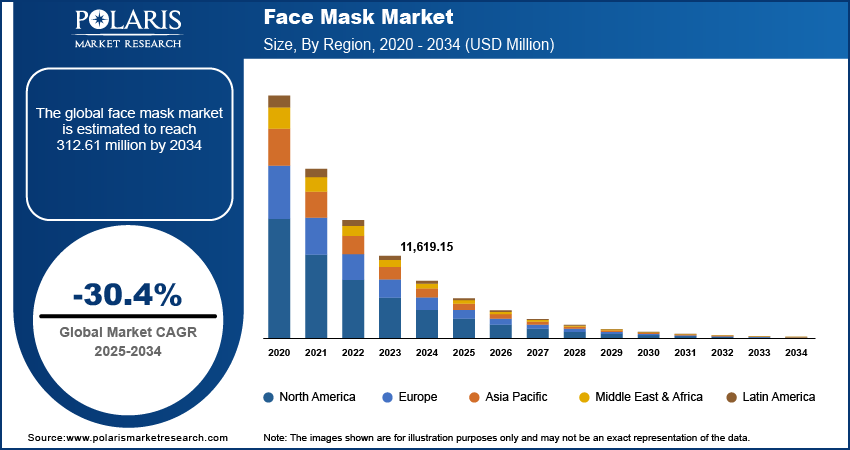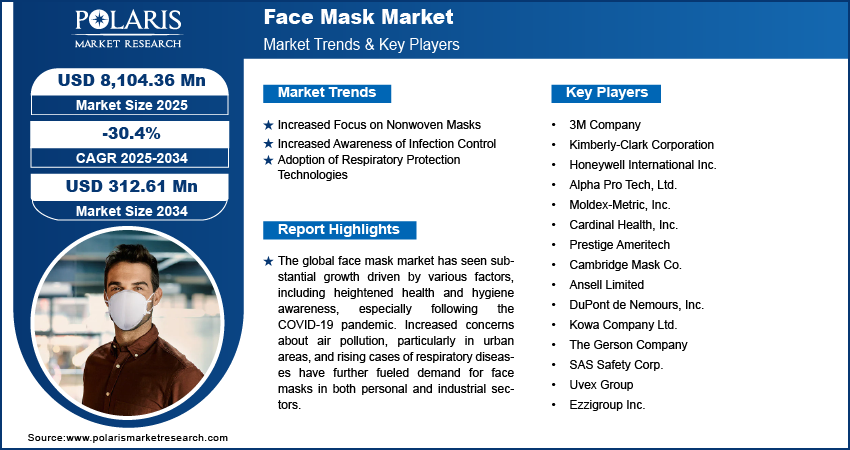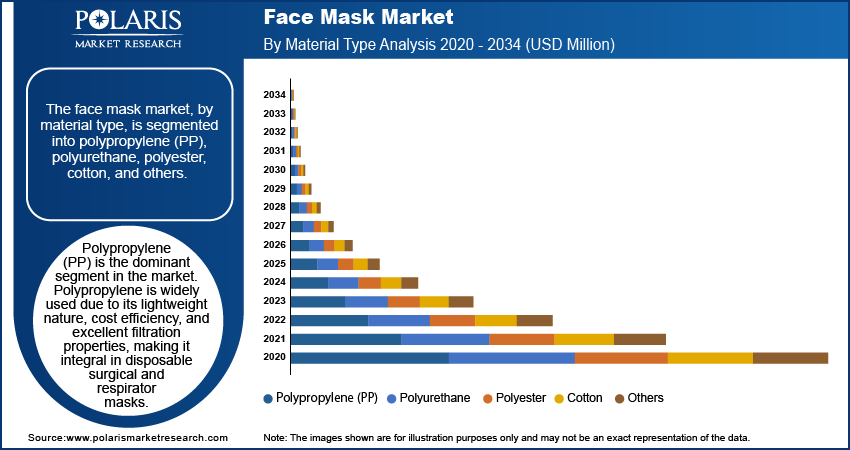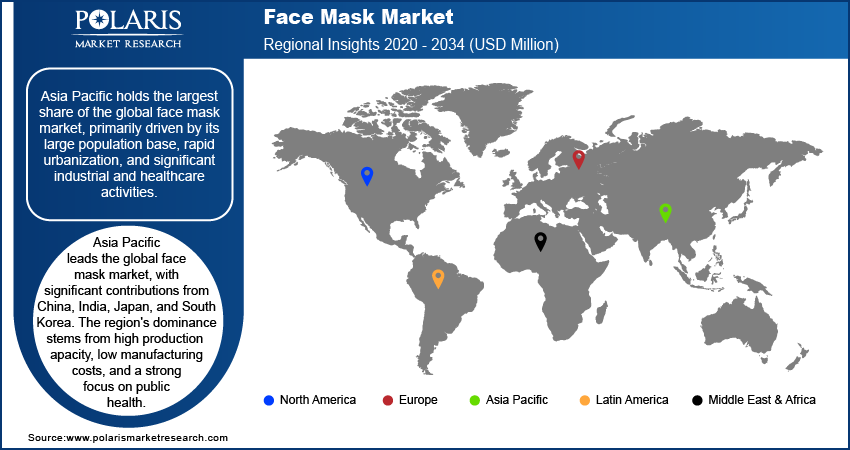
Face Mask Market Size, Share, Trends, Industry Analysis Report: By Material Type, Type (Surgical, Respirator, Procedure, and Others), Nature (Disposable and Reusable), End Use (Hospitals & Clinics, Industrial & Institutional, and Personal/Individual Protection), and Region (North America, Europe, Asia Pacific, Latin America, and Middle East & Africa) – Market Forecast, 2025–2034
- Published Date:Jan-2025
- Pages: 119
- Format: PDF
- Report ID: PM1675
- Base Year: 2024
- Historical Data: 2020-2023
Face Mask Market Overview
The global face mask market size was valued at USD 11,619.15 million in 2024. The market is projected to grow from USD 8,104.36 million in 2025 to USD 312.61 million by 2034, exhibiting a CAGR of -30.4% during 2025–2034.
The global face mask market encompasses the production, distribution, and sale of facial coverings designed for medical, personal, and industrial use. This market has experienced significant growth due to rising health and hygiene awareness, an increasing prevalence of airborne diseases, and the widespread impact of the COVID-19 pandemic. Key face mask market drivers include heightened demand for protective equipment in healthcare and occupational safety, coupled with government mandates in various regions. Trends influencing the market include advancements in reusable and eco-friendly materials, the adoption of antimicrobial and antiviral technologies, and growing consumer interest in masks offering comfort and enhanced breathability.

To Understand More About this Research: Request a Free Sample Report
Face Mask Market Dynamics
Increased Focus on Nonwoven Masks
Nonwoven masks are increasingly popular due to their enhanced filtration capabilities and affordability. These masks are often made of polypropylene and feature multiple layers for superior protection against airborne particles and microorganisms. Advanced manufacturing techniques, such as the use of charged fibers, improve particle-blocking efficiency. For instance, during the COVID-19 pandemic, companies such as Sinopec expanded production of melt-blown nonwoven fabric, a critical material for face masks, to meet global demand.
Increased Awareness of Infection Control
The heightened awareness of infection control, particularly due to the COVID-19 outbreak, has significantly driven the demand for surgical face masks. Healthcare professionals and the general public increasingly recognize the importance of these masks in preventing the spread of infections, contributing to a sustained demand in both medical and non-medical settings. This growing emphasis on personal protective equipment (PPE) in various industries, including healthcare, food processing, and retail, continues to boost the surgical face mask market demand.
Adoption of Respiratory Protection Technologies
Face masks designed with respiratory protection features are increasingly utilized in healthcare and industrial settings. Innovations such as ergonomic designs and multi-layer filtration systems are becoming industry standards. For example, in 2022, Honeywell introduced NIOSH-certified masks with integrated valves to enhance breathability and reduce moisture build-up. Such advancements improve user comfort and comply with stricter safety regulations. Thus, the rising adoption of respiratory protection technologies such as innovative face masks boosts the face mask market development.

Face Mask Market Segment Insights
Face Mask Market Outlook – Material Type-Based Insights
The face mask market, by material type, is segmented into polypropylene (PP), polyurethane, polyester, cotton, and others. Polypropylene (PP) is the dominant segment in the market. Polypropylene is widely used due to its lightweight nature, cost efficiency, and excellent filtration properties, making it integral in disposable surgical and respirator masks. The material's adaptability to advanced manufacturing processes, such as melt-blown technology, enhances its efficacy in filtering airborne particles, which aligns with stringent safety requirements. The widespread adoption of polypropylene is fueled by its prevalence in healthcare and industrial applications, which demand high filtration standards to combat pollutants and pathogens.
The cotton-based masks are experiencing notable growth due to increasing consumer demand for reusable and eco-friendly options. Cotton’s natural, breathable, and skin-friendly characteristics appeal to a broad customer base, especially in personal-use masks. Additionally, polyurethane and polyester are gaining traction for their durability and flexibility, with applications extending to fashion and industrial sectors. These materials' increasing integration with nanotechnology and antimicrobial treatments highlights ongoing innovation across the segment.
Face Mask Market Evaluation – Type-Based Insights
The face mask market, by type, is segmented into surgical, respirator, procedure, and other masks. The surgical segment holds the largest market share due to the widespread use of these masks in healthcare for preventing infections and maintaining sterile environments during surgeries and medical procedures. These masks are lightweight, disposable, and cost-effective, making them a preferred choice in clinical settings and among the general population during pandemics. The increasing prevalence of respiratory diseases and the need for infection control further bolster their demand. Additionally, innovations such as transparent surgical masks, which enhance communication during medical procedures, are gaining traction in the market.
The respirator masks, particularly N95 variants, are witnessing the highest growth due to their superior filtration efficiency and ability to provide higher protection against airborne particles. These masks are especially favored in high-risk environments, including industrial and healthcare settings, due to their tighter fit and compliance with safety standards set by organizations such as the National Institute for Occupational Safety and Health (NIOSH). Their application extends beyond healthcare to industries such as construction and mining, where respiratory protection is essential, driving significant growth of the respirator segment.
Face Mask Market Assessment – Nature-Based Insights
The face mask market, by nature, is bifurcated into disposable and reusable. The disposable segment holds a larger market share due to its widespread use in healthcare settings and for personal safety during outbreaks. Their single-use nature ensures high hygiene standards, making them indispensable for healthcare professionals and individuals in high-risk environments. The demand for disposable masks surged during the COVID-19 pandemic and continues to be significant in settings requiring stringent infection control measures, such as hospitals, clinics, and industrial workplaces.
The reusable segment is projected to register a higher growth rate in the coming years. This segment is gaining traction owing to its cost-effectiveness, environmental benefits, and customization options. Reusable masks are favored for their durability and adaptability, particularly in regions where environmental regulations are influencing consumer behavior toward sustainable products. The growing trend of using reusable masks in daily activities and their popularity as fashion statements further boost their adoption.
Face Mask Market Outlook – End Use-Based Insights
The face mask market, by end use, is segmented into hospitals & clinics, industrial & institutional, and personal/individual protection. The hospitals and clinics segment dominates the market share due to their consistent demand for high-quality protective masks, including surgical and N95 respirators. These masks are essential in reducing cross-contamination and ensuring patient and staff safety in healthcare settings. Additionally, the rising emphasis on infection control in medical facilities, especially following the COVID-19 pandemic, has significantly reinforced this segment's leadership in the market.

The personal/individual protection segment is experiencing the highest growth rate, driven by increasing public awareness regarding health and hygiene. Factors such as rising concerns regarding air pollution in urban areas and the ongoing emphasis on personal safety in densely populated areas contribute to this growth. Additionally, the shift in consumer behavior toward incorporating masks into daily routines, especially in regions with high pollution levels, further supports the expansion of this category. This trend reflects the growing perception of masks as a protective measure beyond medical and industrial applications, aligning with global health awareness initiatives and government regulations across various regions.
Face Mask Market Regional Insights
By region, the study provides face mask market insights into North America, Europe, Asia Pacific, Latin America, and the Middle East & Africa. Asia Pacific holds the largest share of the global face mask market revenue, primarily driven by its large population base, rapid urbanization, and significant industrial and healthcare activities. Countries such as China and India are major contributors due to their high production capacities, affordability of masks, and growing public health awareness. The region's leadership is further supported by the frequent adoption of masks as a preventive measure against air pollution and infectious diseases. In addition, government initiatives to advance healthcare infrastructure and impose strict regulations during the COVID-19 pandemic significantly increased mask consumption. North America and Europe also show substantial demand, primarily driven by high healthcare standards and awareness.
The face mask market expansion in Europe is driven by stringent health and safety regulations and a well-established healthcare infrastructure. Countries such as Germany, the UK, and France account for a significant portion of the demand due to their proactive approaches to public health and occupational safety standards. The adoption of face masks is also supported by the increasing prevalence of respiratory diseases and the heightened need for personal protective equipment (PPE) in industrial settings. Additionally, environmental awareness is encouraging the use of sustainable and reusable masks in the region.

Face Mask Market – Key Players and Competitive Insights
Key players in the face mask market include prominent global and regional manufacturers offering a variety of disposable and reusable face masks. Notable companies active in this market are 3M, Kimberly-Clark, Honeywell International Inc., Cardinal Health, Alpha Pro Tech, Moldex-Metric, Prestige Ameritech, and others. Other participants include Ansell Limited, Cambridge Mask Co., DuPont de Nemours Inc., Kowa Company Ltd., and The Gerson Company. Additionally, SAS Safety Corp., Uvex Group, and regional manufacturers such as Ezzigroup Inc. contribute significantly to market offerings. Despite consolidation trends, these firms actively innovate, with some increasing investments in sustainable and multifunctional mask designs.
Competitive dynamics in the face mask market reflect a strong focus on product innovation and compliance with regulatory standards. Companies such as Cambridge Mask Co. emphasize reusable masks with advanced filtration technology, while firms such as Alpha Pro Tech and Kimberly-Clark cater to industrial and medical needs. The market also sees the growing influence of regional players, such as Ezzigroup Inc., which develops ASTM-certified and eco-friendly masks. Global players often leverage economies of scale, robust distribution networks, and strategic partnerships to maintain competitive advantage.
Insights reveal a shift toward sustainable materials and advanced features in masks, such as enhanced comfort and filtration efficiency. Regulatory compliance remains a key differentiator, with stringent standards driving innovation among manufacturers. Additionally, geopolitical and supply chain challenges have influenced production localization trends, fostering regional market growth. Collectively, these dynamics underline the competitive yet collaborative nature of the face mask industry.
3M, headquartered in Minnesota, US, is a manufacturer of face masks, including N95 respirators widely used in healthcare and industrial sectors. The company is recognized for its technological innovations in filtration systems.
Kimberly-Clark, based in Texas, US, produces a range of personal protective equipment, including surgical masks and procedure masks used in medical and commercial settings. The company focuses on sustainability and product safety.
List of Key Companies in Face Mask Market
- 3M Company
- Kimberly-Clark Corporation
- Honeywell International Inc.
- Alpha Pro Tech, Ltd.
- Moldex-Metric, Inc.
- Cardinal Health, Inc.
- Prestige Ameritech
- Cambridge Mask Co.
- Ansell Limited
- DuPont de Nemours, Inc.
- Kowa Company Ltd.
- The Gerson Company
- SAS Safety Corp.
- Uvex Group
- Ezzigroup Inc.
Face Mask Industry Developments
- In October 2024, Kimberly-Clark launched a new line of biodegradable masks aimed at reducing environmental impact, catering to growing consumer demand for sustainable healthcare products.
- In September 2024, 3M announced an expansion of its respirator production capacity in Europe to address increasing regional demand for high-quality respiratory protective equipment, particularly in response to evolving workplace safety regulations
Face Mask Market Segmentation
By Material Type Outlook
- Polypropylene (PP)
- Polyurethane
- Polyester
- Cotton
- Others
By Type Outlook
- Surgical
- Respirator
- Procedure
- Others
By Nature Outlook
- Disposable
- Reusable
By End Use Outlook
- Hospitals & Clinics
- Industrial & Institutional
- Personal/Individual Protection
By Regional Outlook
- North America
- US
- Canada
- Europe
- Germany
- France
- UK
- Italy
- Spain
- Netherlands
- Russia
- Rest of Europe
- Asia Pacific
- China
- Japan
- India
- Malaysia
- South Korea
- Indonesia
- Australia
- Vietnam
- Rest of Asia Pacific
- Middle East & Africa
- Saudi Arabia
- UAE
- Israel
- South Africa
- Rest of Middle East & Africa
- Latin America
- Mexico
- Brazil
- Argentina
- Rest of Latin America
Face Mask Market Report Scope
|
Report Attributes |
Details |
|
Market Size Value in 2024 |
USD 11,619.15 million |
|
Market Size Value in 2025 |
USD 8,104.36 million |
|
Revenue Forecast by 2034 |
USD 312.61 million |
|
CAGR |
-30.4% from 2025 to 2034 |
|
Base Year |
2024 |
|
Historical Data |
2020–2023 |
|
Forecast Period |
2025–2034 |
|
Quantitative Units |
Revenue in USD million and CAGR from 2025 to 2034 |
|
Report Coverage |
Revenue Forecast, Market Competitive Landscape, Growth Factors, and Trends |
|
Segments Covered |
|
|
Regional Scope |
|
|
Competitive Landscape |
|
|
Report Format |
|
|
Customization |
Report customization as per your requirements with respect to countries, regions, and segmentation. |
FAQ's
The global face mask market size was valued at USD 11,619.15 million in 2024 and is projected to grow to USD 312.61 million by 2034.
The global market is projected to register a CAGR of -30.4% during 2025–2034
Asia Pacific held the largest share of the global market in 2024.
Key players in the face mask market include prominent global and regional manufacturers offering a variety of disposable and reusable face masks. Notable companies active in the market are 3M, Kimberly-Clark, Honeywell International Inc., Cardinal Health, Alpha Pro Tech, Moldex-Metric, and Prestige Ameritech. Other participants include Ansell Limited, Cambridge Mask Co., DuPont de Nemours Inc., Kowa Company Ltd., and The Gerson Company.
The polypropylene (PP) segment accounted for the largest share of the global market in 2024.
The surgical mask segment accounted for the largest share of the global market in 2024.
A face mask is a protective covering worn over the nose and mouth to reduce the risk of inhaling harmful particles, contaminants, or airborne diseases. These masks are commonly made from various materials such as polypropylene, cotton, and polyester, with the most popular types being surgical masks, respirators such as N95, and reusable cloth masks. Surgical masks are typically used in medical settings to prevent the spread of infections, while respirators offer higher levels of protection by filtering out fine particles. Face masks have gained significant global attention due to their role in preventing the spread of diseases, particularly respiratory infections such as COVID-19. They are also used in industrial settings to protect workers from dust, chemicals, and other airborne hazards.
A few key face mask market trends are described below: Sustainability and Eco-Friendly Products: Increasing demand for reusable and biodegradable masks as consumers become more environmentally conscious. Advanced Filtration Technology: Growing adoption of masks with enhanced filtration capabilities, such as N95 and KN95 respirators, to provide better protection against airborne particles. Rise of Fashion and Customization: Customizable and stylish face masks have become popular, driven by consumer preferences for comfort, design, and personalized options. Health and Hygiene Awareness: Increased global focus on personal hygiene and preventive health measures, especially following the COVID-19 pandemic, boosting the demand for face masks.
For a new company entering the face mask market, focusing on sustainability, product differentiation, and advanced filtration technology could provide a competitive edge. Offering reusable, eco-friendly masks made from sustainable materials would align with the growing consumer preference for environmentally conscious products. Additionally, developing masks with enhanced filtration capabilities, such as N95 or multi-layered options, can attract health-conscious customers. Customizable designs and fashionable variants would appeal to consumers seeking functionality and style. Strategic partnerships with healthcare providers or companies in need of large-scale PPE supplies could help in quickly gaining market access and visibility.
Companies manufacturing, distributing, or purchasing face masks and related products and other consulting firms must buy the report.
